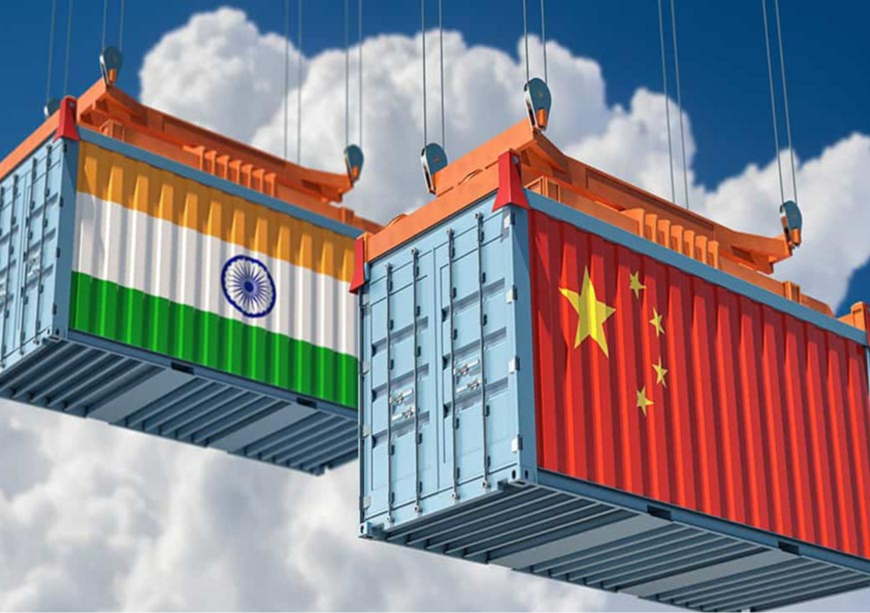-
CENTRES
Progammes & Centres
Location

Trade between India and China has never been higher, with last year’s figures reaching a record US$136 billion. India and China are also at loggerheads over a border dispute that claimed at least 20 lives on both sides in 2020, and have held 21 rounds of military negotiations in the period since. Clearly, the diplomat’s work on Raisina Hill is challenging: balancing economic cooperation and security concerns poses a complex challenge for both countries, as deeper economic ties may enhance stability, but security implications can threaten long-term harmony, as was seen in Galwan.
A survey under the German Excellence Cluster "Contestations of the Liberal Script”, which was conducted by CPC Analytics across India of Indian voters, has some important findings concerning mass opinions about China. The respondents were less likely to approve of a development project when they thought that the money and expertise behind it originated from China, as compared to when they thought that the partner was the United States (US), or if their local government was executing the project alone. Our respondents also had less trust in the project under these conditions.
The respondents were less likely to approve of a development project when they thought that the money and expertise behind it originated from China, as compared to when they thought that the partner was the United States (US), or if their local government was executing the project alone.
The CPC analytics team conducted in-person interviews of some 2,500 respondents in four diverse Indian states—Madhya Pradesh, Punjab, West Bengal, and Tamil Nadu—these states were selected because they host development projects financed by both the China-located Asian Infrastructure Investment Bank (AIIB) and the US-located World Bank. Besides their geographic and cultural differences, the ruling governments in these states are also formed by four different political parties: Bharatiya Janata Party in Madhya Pradesh, Aam Aadmi Party (AAM) in Punjab, Trinamool Congress in West Bengal, and Dravida Munnetra Kazhagam in Tamil Nadu.
The study, conducted in September 2023, started with the intention of finding out Indian voter preferences about who should fund a hypothetical infrastructure project: whether they wanted their local government to fund it alone, or jointly with a multi-lateral development bank like the AIIB or the World Bank.
We found that people approved of and trusted a development project the most when it was financed by the local government alone, i.e., without any assistance from either the AIIB or the World Bank, and that they rated a project lowest when they learnt that funding would be derived from the China-located AIIB. After the local government, the second favourite option was the World Bank, and at the third spot was the same institution when we included the information that its headquarters was in Washington, D.C. Respondents approved of the AIIB about as much when the location of its physical headquarters was not disclosed, but there was a clear drop-off when “Beijing” was included with “AIIB.”
Note that the AIIB is a multi-lateral development bank with 109 members, which means that it has many countries as shareholders, not just China. In terms of public perceptions, however, there have been allegations that China, and its ruling party, play an outsized role. The Bank is alleged to have ties with the Chinese Communist Party (CCP)—claims that have been refuted by both the bank and the party. In June last year, Canada froze ties with the AIIB after a former official at the bank, its national, claimed that the institution was “dominated” by the CPP.
Bitterness over the border notwithstanding, India has chosen to remain a dedicated member of the AIIB, fully participating in its funding processes.
In terms of India’s role, note that it became one of the AIIB’s founding members in 2016. In 2018, it hosted the AIIB’s annual summit. Bitterness over the border notwithstanding, India has chosen to remain a dedicated member of the AIIB, fully participating in its funding processes. Currently, India is its largest borrower and second-largest shareholder, owning around 7.5 percent voting power. China is the biggest, owning over 26.5 percent, and has veto powers. Out of 202 projects approved by the AIIB between 2016 to 2022, India hosts the most (39). To put this in perspective, Türkiye and Bangladesh are together at the second-highest spot (17 projects each). As per AIIB records, this means that India is bound to receive approved financing to the tune of US$9 billion, or 23 percent of the institution’s total kitty of US$38.8 billion from the eight-year period.
Nonetheless, even at home, Indian borrowing from the bank has not gone without controversy. It has been flagged that engaging with the AIIB while the northern border remained restive seems incoherent. The country’s Foreign Minister has since been walking a tightrope, and in February acknowledged the trickiness of his assignment, saying that it was not possible to “go to the next room” and discuss something else if there was a standoff at the borders.
The sentiment that in the survey is not without parallel in other parts of the world. A meta-analysis of Chinese assistance has shown that money flowing from China into the rest of the developing world has led to mixed economic outcomes and has in fact worsened Beijing’s image in some host countries while it has raised China’s profile in others. To be sure, Western-backed aid, too, has a less-than-inspiring record.
The survey’s findings demonstrate that public sentiment is intricately linked to factors such as the implementing institution, its location, and existing beliefs about countries associated with the institution. This effect can be seen as a result of very strong opinions amongst Indians about China, with about two-thirds of the population found to have a negative view of the country. This suggests that preconceived notions about countries and institutions play a significant role in shaping public opinion.
Mark Hallerberg is Professor of Public Management and Political Economy, Hertie School, Berlin.
Sahil Deo is Co-Founder at CPC Analytics, a data-driven public policy consulting firm.
Om Marathe is a Research and Data Analyst at CPC Analytics.
Jayati Sharma is a Research and Data Analyst at CPC Analytics.
The views expressed above belong to the author(s). ORF research and analyses now available on Telegram! Click here to access our curated content — blogs, longforms and interviews.

Mark Hallerberg is Professor of Public Management and Political Economy, Hertie School, Berlin. ...
Read More +
Non-resident fellow at ORF. Sahil Deo is also the co-founder of CPC Analytics, a policy consultancy firm in Pune and Berlin. His key areas of interest ...
Read More +